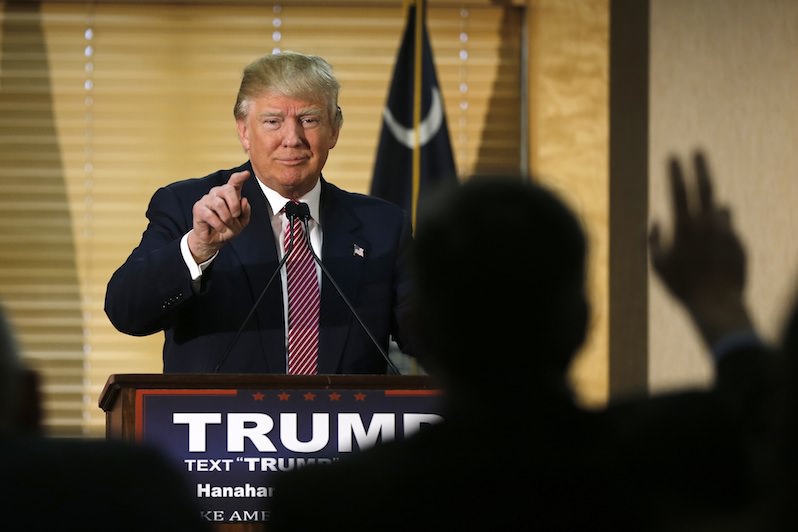The Media Buy In to Donald Trump’s Authoritarian America
Now that he has bullied his way into the mainstream, it’s time for the media to take a serious look at his policies and the dreadful consequences they would have if he occupied the Oval Office. Donald Trump calls on a member of the media during a news conference Monday in Hanahan, S.C. (Matt Rourke / AP)
Donald Trump calls on a member of the media during a news conference Monday in Hanahan, S.C. (Matt Rourke / AP)
It was inevitable. The bullying, authoritarian Donald Trump is now accepted as part of the mainstream.
He seems to be appealing not only to Republicans and independents but also to a handful of Democrats. Early in the presidential nomination campaign, journalists acted as though they would quickly cut him down to size. Now they are treating the onetime laughingstock with respect. Cable news hosts await his phone calls and permit him to rant at length. His victory Saturday in South Carolina’s primary will undoubtedly make them even more welcoming. His outrageous statements will continue to be considered funny, endearing gaffes. Pushed to the background are his inflammatory demands for deportation of undocumented Latinos and his attacks on Muslims.
The practices of 21st-century journalism are playing into this scheme. On the Internet, the number of readers is measured in clicks or views, and the number of views for a particular story influences the way website managers display stories. This has long been true for broadcast media. Trump draws clicks and television ratings. He is encouraged, as if he is a regular candidate rather than what Vox’s Ezra Klein called “the most dangerous major candidate for president in memory.”
When the Trump phenomenon began taking off last year, I wrote on Truthdig that watching him attack Muslims was like listening to Hitler on the radio in the early 1930s. A few people told me the Hitler comparison was extreme. I asked myself if I was guilty of overreach.
Then I read Thomas B. Edsall’s online New York Times opinion column Jan. 6, “Purity, Disgust and Donald Trump,” analyzing the Trump phenomenon and its relationship to authoritarianism, the anti-democratic philosophy of blind submission to authority that denigrates the rights and opinions of others. Edsall, a Columbia University professor, covered national politics, Congress, race, labor and other domestic matters for The Washington Post for 25 years.
He quoted a number of scholars, including New York University professor Jonathan Haidt, a social psychiatrist. Trump, Haidt wrote, “is not a conservative, and is not appealing to classical conservative ideas. He is an authoritarian, who is profiting from the chaos in Washington, Syria, Paris, San Bernardino, and even the chaos on campuses which are creating a more authoritarian electorate in the Republican primaries.”
Edsall adds, “In other words, the segment of the electorate drawn to Trump is especially receptive to mobilization at times of perceived disorder—of a belief in looming external threats, from the Islamic State to Syrian refugees to illegal immigration from Latin America.”
The presidential campaign has been reshaped into something unrecognizable from the past. And it’s coming from this one man, with his sneering words and scornful mugging when his debate opponents speak. Across the aisle, Hillary Clinton and Bernie Sanders look quite civilized as they engage in their own fierce fight for the Democratic nomination.
In remaking the political landscape, Trump combines anger over an unequal economy with racist attacks on Latinos and Muslims, scapegoating them, reaching into a strain of bigotry always present in American life. It’s a toxic combination, playing on people’s fears in a troubled time.
The future of a Trump United States can be seen in Maricopa County, Ariz., where anti-immigrant Sheriff Joe Arpaio, a tyrannical authoritarian, supervises law enforcement for a large unincorporated area outside Phoenix and for some small communities.
Arpaio has endorsed Trump, saying, “Everything I believe in, he’s doing, and he’s going to do it when he becomes president.” To that, Trump said, “This is a man when we talk about borders — this is a man that believes in borders, and getting his endorsement means a lot to me.”
Arpaio is infamous for his department’s stops of Latinos, demanding documents showing their citizenship status — a mixture of racial profiling and authoritarian behavior. The Phoenix New Times, which has reported for 20 years on Arpaio’s “serious abuse of power,” wrote, “The self-described ‘Toughest Sheriff in America’ has fostered horrendous jail conditions, reckless police operations, and carried out personal vendettas against political rivals and members of the press. In the past year or more, he has also appointed himself enforcer of the nation’s immigration laws in Arizona, and a whole new series of problems has emerged. Foremost, he and his deputies have violated the Constitutional rights of brown-skinned U.S. citizens and have committed outright cruelty against the undocumented.”
Only the federal government, although its authority is being limited, offers at least a measure of protection from such police-state behavior. All over the United States, including in Ferguson, Mo., Baltimore and Chicago, the threat of federal intervention stands between racist police conduct and minorities. Within the federal government, even the Border Patrol feels such limitations.
A Trump presidency would unleash a wave of oppression, beginning with—as he promises—mass deportations of millions who are racially profiled and who fit into the Joe Arpaio classification of “illegal immigrants.” Worse yet, a Trump victory would unleash the worst impulses of his supporters, just as Hitler and Mussolini did among theirs in the 1930s.
Let’s hope for the unlikely: that the news media—digital, broadcast and print—will not be so dazzled by Trump’s most recent victory that he escapes without being challenged on his vision of an authoritarian America.
Your support matters…Independent journalism is under threat and overshadowed by heavily funded mainstream media.
You can help level the playing field. Become a member.
Your tax-deductible contribution keeps us digging beneath the headlines to give you thought-provoking, investigative reporting and analysis that unearths what's really happening- without compromise.
Give today to support our courageous, independent journalists.






You need to be a supporter to comment.
There are currently no responses to this article.
Be the first to respond.